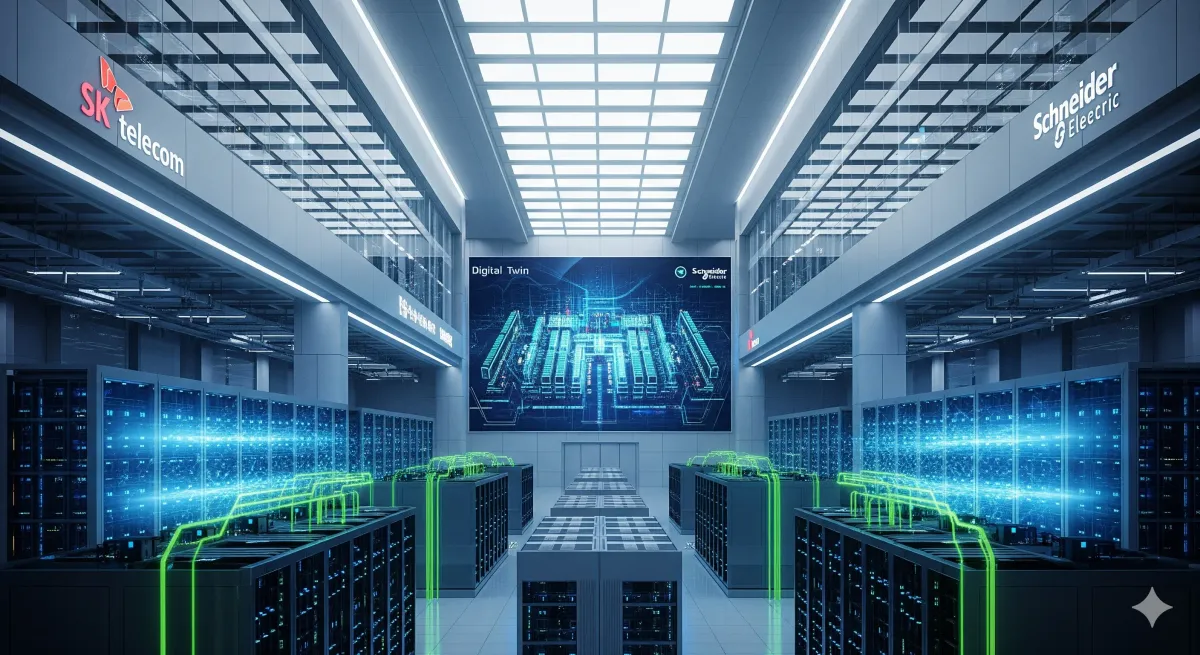SKT-Schneider Electric Partnership Analysis: A New Turning Point for Korea's AI Ecosystem
The August 31 2025 agreement between SK Telecom and Schneider Electric for the Ulsan AI Data Center marks a strategic step to secure Korea’s AI infrastructure sovereignty. The partnership aims to boost balanced regional growth, strengthen competitiveness, and drive the nation’s AI ecosystem forward.

Through this collaboration, Korea expects to generate annual revenues of 1 trillion won from data center operations by 2030, create 78,000 jobs, and enable consumers to access more affordable and reliable AI services.
SKT and Schneider Electric: Core Facts of the Partnership
Key Elements of the Agreement
The two companies first established their partnership at MWC25 in March, subsequently forming a working group to explore specific collaboration strategies¹. The core of this contract involves Schneider supplying integrated MEP (Mechanical, Electrical, and Plumbing) equipment across five categories to the 'SK AI Data Center Ulsan': switchgear, UPS (Uninterruptible Power Supply), transformers, and automated control systems¹.
Particularly noteworthy is the integration of Schneider's ETAP (Electrical Transient Analyzer Program) solution with SKT's unified AI DCIM (Data Center Infrastructure Management) system to pursue digital twin-based operational optimization¹. Additionally, the partnership expands to include joint development of UPS and Energy Storage Systems (ESS) leveraging SK On's lithium-ion battery technologies, extending collaboration across the entire SK Group².
Schneider Electric's Corporate Identity
Schneider Electric is a multinational corporation founded in France in 1836, serving as a global leader in energy management and automation³. The company employs 170,000 people worldwide and recorded revenues of €38.15 billion (approximately $42 billion) in 2024, making it a Fortune Global 500 company⁴. The company particularly excels in MEP equipment for AI data centers globally, with strengths in providing integrated infrastructure solutions from design through construction to operations³.
Core Projects the Companies Are Pursuing
Ambitious Plans for Ulsan AIDC
The Ulsan AIDC being jointly developed by SKT and Schneider targets initial operations in 2027, with plans to eventually expand to 1GW (gigawatt) capacity⁵. This will be Korea's largest AI-dedicated data center, capable of accommodating 60,000 GPUs and securing over 300MW of capacity by 2030⁶. SKT expects to generate annual revenues of 1 trillion won from data center operations alone by 2030⁶.
Core Innovation Elements
The partnership encompasses four critical areas of collaboration. First, the integration and commercialization of SKT's unified AI DCIM with Schneider's automated control systems. Second, the development of MEP reference designs and joint execution of data center design and construction services. Third, the joint design of prefabricated integrated solutions to significantly reduce construction timelines. Fourth, collaborative sales initiatives to expand their Energy-as-a-Service (EaaS) business⁷.
Impact on Korea's AI Ecosystem
Establishing Infrastructure Sovereignty
While Korea's data center market is projected to grow to 10 trillion won by 2028⁸, it faces an imbalance problem with 73% concentration in the Seoul metropolitan area⁹. The Ulsan AIDC will serve as a strategic hub that addresses these structural issues while securing technological sovereignty. The introduction of ETAP digital twin technology, which enables AI-powered simulation of power requirements, provides Korea with an opportunity to set global standards for AI data center operations¹⁰.
Revitalizing the Startup Ecosystem
Currently, domestic AI startups are struggling with the steep rise in costs for high-performance GPUs and data center infrastructure¹¹. However, once the Ulsan AIDC becomes operational and provides stable GPU resource supply with competitive pricing, startup technology development and service launches are expected to accelerate significantly. AI startups have already expressed strong intentions to proactively utilize domestically built AI data centers¹¹.
Industrial Cluster Effects
The Ulsan AIDC is expected to create 78,000 jobs and generate an economic impact of 25 trillion won¹². This represents more than mere numbers—it signifies the birth of an AI industrial ecosystem centered around Ulsan. This will mark a historic transformation of Ulsan from a manufacturing-focused city to an AI hub, serving as an important model for distributing data centers from the capital region to non-metropolitan areas and contributing to balanced national development¹³.
Korea's Emerging Role in the Global AI Market
Leap Toward Becoming an Asian AI Hub
While Thailand and Malaysia are emerging as new data center hubs in Southeast Asia¹⁴, Korea is pursuing a differentiation strategy based on technological superiority. As global companies expand data center investments across Asia utilizing low operating costs and easily accessible land¹⁴, Korea has chosen a strategy of securing competitiveness through advanced technology.
Transition to a Technology Exporter
If SKT's AI pyramid strategy of "self-reliance and cooperation" succeeds, Korea can transition from importing AI infrastructure technology to exporting it. By proactively contributing to the government's 'AI highway construction' and 'national innovation hub development goals', the partnership is expected to establish itself as an important partner in future government AI policy implementation¹⁵.
Tangible Benefits for Consumers
AI Service Cost Reduction
The introduction of advanced AI technology capable of reducing data center operating costs by up to 30%¹⁶ will ultimately lead to lower AI service pricing. This creates a foundation for democratizing AI services that were previously limited due to expensive GPU costs. Similar to how Meta and Google achieved 31% and 40% cost reductions respectively by applying AIOps to their self-built data centers¹⁶, significant efficiency improvements are anticipated.
Enhanced Service Quality and Accessibility
Once the Ulsan AIDC becomes fully operational, improved latency will significantly enhance the quality of real-time AI services. Particularly for technologies where response speed is critical—such as autonomous vehicles, virtual reality (VR), augmented reality (AR), and Internet of Things (IoT)—users will experience noticeable improvements as data processing occurs closer to their location in real-time¹⁷.
Data Sovereignty and Enhanced Security
The expansion of domestic AI data centers will reduce the risk of personal and corporate data flowing overseas while strengthening data sovereignty. This is expected to have a positive long-term impact on consumer privacy protection and significantly enhance the reliability and stability of domestic AI services.
Q&A
Q: What's the most significant meaning of this partnership?
A: It establishes a foundation for Korea's transition from being a 'technology-dependent nation' to a 'technology-leading nation' in AI infrastructure. The preemptive introduction of the world's first AI-based power simulation digital twin technology means Korea has an opportunity to set global standards for AI data center operations.
Q: When will consumers start experiencing tangible changes?
A: Quality improvements and cost reductions in AI services can be experienced starting from the first phase operation of Ulsan AIDC in 2027. Enhanced response speeds for real-time AI services and lower service pricing are expected to be the most direct benefits.
Q: What will Korea's status be if this project succeeds?
A: Korea can leap forward as an Asian AI hub, setting technological standards and becoming a country that exports AI infrastructure technology. It will also present a new model for balanced national development by resolving the 73% concentration imbalance in the capital region.
Q: What are the biggest risks?
A: Bottlenecks that may occur during infrastructure construction, including power supply limitations and permit delays. Specifically, while the required power application capacity until 2027 is 7,343MW, the actual available supply capacity is only 4,718MW, creating an anticipated 36% power shortage problem.
References
- SK Telecom Official Newsroom, "SKT Partners with Schneider Electric for 'SK AI Data Center Ulsan' Construction" (Aug 31, 2025) https://news.sktelecom.com/214754
- SK Telecom-Schneider Electric Partnership Expansion MOU Press Release
- Schneider Electric Korea Official Website https://www.se.com/kr/ko/about-us/company-profile/
- Wikipedia, "Schneider Electric" https://ko.wikipedia.org/wiki/슈나이더_일렉트릭 5-6. E-Daily, "SKT 'Ulsan AIDC Operations in 2027...Expected Annual Revenue of 1 Trillion Won from 2030'" (Aug 6, 2025) https://ir.edaily.co.kr/News/Read?k=04883926642264696
- E-Today, "SKT Partners with Schneider Electric for 'SK AI Data Center Ulsan' Construction" (Aug 31, 2025) https://www.etoday.co.kr/news/view/2501670
- SK Ecoplant Newsroom, "Data Center Paradigm Changed by AI" (July 2025) https://news.skecoplant.com/plant-tomorrow/18677/
- Goover Report, "AI Infrastructure Core 'Data Centers' Status and Challenges: Metropolitan Concentration" (June 2025) https://seo.goover.ai/report/202506/go-public-report-ko-14c9bb75-026b-4a40-aadc-9dae07faff3e-0-0.html
- ICN Magazine, "Schneider Electric-ETAP Revolutionize Data Center Power Management with AI-Based Digital Twin Technology" (Mar 21, 2025) https://icnweb.kr/2025/75556/슈나이더-일렉트릭-etap-ai-기반-디지털-트윈-기술로-데이/
- Digital Daily, "[Data Center Momentum]④ 'Suffocating Costs'...Deepening Sighs of AI Startups" (June 13, 2024) https://m.ddaily.co.kr/page/view/2024061317220510889
- TechM, "President Lee Jae-myung 'Ulsan AIDC, Hope for Regional Economy and Industry'...SK Chairman Chey Tae-won 'Need Support for AI Market Creation'" (June 20, 2025) https://www.techm.kr/news/articleView.html?idxno=141165
- Ulsan Daily News, "[Editorial] Ulsan's Groundbreaking Ceremony for World-Class AI Hub Construction" (Aug 30, 2025) https://www.iusm.co.kr/news/articleView.html?idxno=1054031
- Goover Report, "Changes in Korea's Data Center Market in 2025: Challenges and Opportunities" https://seo.goover.ai/report/202503/go-public-report-ko-edc74fa1-4d5c-4e9a-b1d4-d091465e8792-0-0.html
- E-Daily, "SKT 'Ulsan AIDC Operations in 2027...Expected Annual Revenue of 1 Trillion Won from 2030'" (Aug 6, 2025) https://ir.edaily.co.kr/News/Read?k=04883926642264696
- Seoul Economic Daily, "'Will Reduce Data Center Operating Costs by 30% with Advanced AI Technology'" (May 7, 2025) https://www.sedaily.com/NewsView/2GSPV2Y6CG
- Goover Report, "Changes in Korea's Data Center Market in 2025: Challenges and Opportunities" https://seo.goover.ai/report/202503/go-public-report-ko-edc74fa1-4d5c-4e9a-b1d4-d091465e8792-0-0.html




